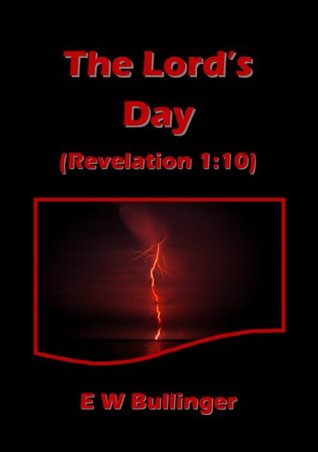The Lord's Day
by E.W. Bullinger
The Lord’s Day! Is it Saturday? Or Sunday? Or is it “The Great and Terrible Day of the Lord” spoken of by the Prophets?
These are important questions, for this expression occurs at the start of the Revelation. How we understand this expression will determine where in time we place the action described in the rest of Revelation and will, in some ways, affect our interpretation of the whole book.
This publication contains all that Bullinger has written on The Lord’s Day and Revelation 1:10. It has combined his writings on the subject from his magazine Things to Come and from his books How to Enjoy the Bible and The Apocalypse (later editions entitled Commentary on Revelation).
We hope the reader will study this book and appreciate why Bullinger’s scholarship and attention to detail is still valued by many today.
These are important questions, for this expression occurs at the start of the Revelation. How we understand this expression will determine where in time we place the action described in the rest of Revelation and will, in some ways, affect our interpretation of the whole book.
This publication contains all that Bullinger has written on The Lord’s Day and Revelation 1:10. It has combined his writings on the subject from his magazine Things to Come and from his books How to Enjoy the Bible and The Apocalypse (later editions entitled Commentary on Revelation).
We hope the reader will study this book and appreciate why Bullinger’s scholarship and attention to detail is still valued by many today.
BUY NOW
Kindle Edition, 56 pages
Published February 22nd 2013 by The Open Bible Trust
© 2025 Bibleportal.com 版权所有.

E.W. Bullinger (1837 - 1913)
was an Anglican clergyman, Biblical scholar, and ultradispensationalist theologian. In the spring of 1867, Bullinger became clerical secretary of the Trinitarian Bible Society, a position he would hold till his death in 1913. Bullinger was editor of a monthly journal Things to Come subtitled A Journal of Biblical Literature, with Special Reference to Prophetic Truth. The Official Organ of Prophetic Conferences for over 20 years (1894–1915) and contributed many articles.E.W. Bullinger was noted broadly for three works: A Critical Lexicon and Concordance to the English and Greek New Testament (1877); for his ground-breaking and exhaustive work on Figures of Speech Used in the Bible (1898); and as the primary editor of The Companion Bible (published in 6 parts, beginning in 1909; the entire annotated Bible was published posthumously in 1922). These works and many others remain in print (2004).
Ethelbert William Bullinger was born on December 15 in Canterbury, England. He was a direct descendent of the great Swiss Reformer Johann Heinrich Bullinger, a covenant theologian, who succeeded Zwingli in Zurich in December of 1531.
Bullinger was educated at King's College, London. He was a recognized scholar in the field of biblical languages. The Archbishop of Canterbury granted him an honorary Doctor of Divinity degree in 1881 in recognition of his biblical scholarship.
Dr. Bullinger believed in and taught the pretribulation, premillennial rapture. He is also considered an untradispensationalist because he taught that the gospels and Acts were under the dispensation of law, with the church actually beginning at Paul's ministry after Acts 28:28.
Dr. Bullinger died on June 6, 1913, in London, England, leaving behind a legacy of works to help in the study of God's Word.
... Show more